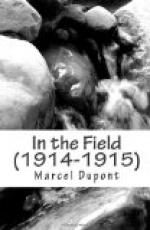We were reduced to employing against them their own tactics of mounted infantry. The good old times of hussar charges are past—gone, together with plumes, pelisses waving in the wind, Hungarian braiding, and sabretaches. It would be senseless to continue to be a horseman in order to fight men who are no longer cavalrymen and do not wish to be so. We should fight at a disadvantage, and since the opening of the campaign too many brave soldiers have paid with their lives for their delight in epic fights a la Lasalle.
I searched the edge of the wood carefully with my field-glasses. Before entering it I wanted to be quite sure whether any movement could be discovered, whether any of the brushwood showed signs of being drawn aside by sharpshooters too eager for a shot. My men were on the watch, crouching in attitudes that would have pleased Neuville, their carbines ready, looking with all their eyes and listening with all their ears. Nothing! I called Vercherin with a low whistle. The silence was such that he heard it. He understood the sign I made him, and, holding his carbine high, he went slowly towards the wood and got into it quickly by the road.
My heart beat for a moment when I saw my scout getting near the thick border-line of trees; but now I breathed again. We went in after him, each one by a different opening, and we passed through it as quickly as the horses’ legs and the difficulties of the ground would allow. On arriving at the further side I was glad to see my four companions emerging, almost at the same moment, from the thick woody tangle. I could see their grave and confident faces turned towards me. On the ridge in front of us, near a solitary tree, stood Vercherin, clear against the sky and motionless.
We had soon rejoined him, and from this height we saw on the next hill the second wood which hid the village of Courgivault from our view, about a kilometre further off. I feared very much that this second barrier might be used by the enemy as a formidable line of defence, and on that account I ordered the approach to be made with still greater precautions than before. But, as in the first case, we found it empty, and passed through without let or hindrance.
I expected to see Courgivault at once, but a rise in the ground hid it still. I took advantage of this natural cover for getting my men forward without risking a shot. Then, still preceded by Vercherin, we debouched on the plateau on which the village stood.
Those who have found themselves in a similar situation know by experience the sudden emotion that is felt when one sees a few hundred yards off the objective of one’s mission, the decisive point one has to reach, cost what it may; the point where one is almost sure to find the enemy in hiding, where one has a suspicion that he sees one, is watching one, silently following all one’s movements, and only waiting for the opportunity of picking one off by an unerring shot.




